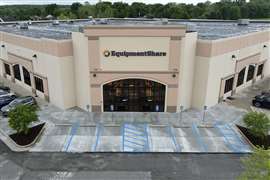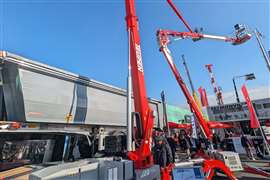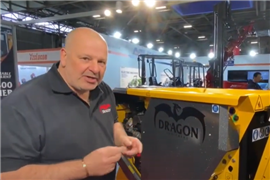Next engine stage for JCB
15 April 2013

JCB’s strategy for a US Tier 4 Final and European Stage IV engine has been revealed at Bauma 2013 – it said its Ecomax T4F range would meet stringent emissions regulations without the use of a diesel particulate filter (DPF).
Tim Burnhope, chief innovation and growth officer, said at the show that this meant that the new engine would fit in the existing JCB machine designs.
He said that the engine would meet the regulations by using a “compact, highly efficient selective catalytic reduction (SCR) system for NOx reduction”.
JCB claimed the use of innovative efficient combustion technology, minimising exhaust emissions within the engine, was being used rather than relying on extensive after-treatment systems to clean up the exhaust gases.
It also claimed that with the Tier 4 Final/Stage IV solution there will be up to a 5% fuel efficiency improvement over existing models, easy installation into existing machinery, a compact “one-can” exhaust solution, and the ability for JCB dealers to de-tier for the used equipment market in less stringently regulated countries .
A compact SCR solution with a urea-based additive will be used on engines above 55kW (74hp). This SCR system will be incorporated into a single exhaust muffler, in many cases replacing the existing exhaust and providing a “one-can” solution, delivering the same overall dimensions for machine designers.
The SCR system will use just a 2 to 3% ratio of exhaust additive to fuel. JCB said it had engineered a space-efficient mixing system for the SCR that offered a reduced exhaust flow distance between the engine and the catalyst.
Mr Burnhope pointed out that with this system, the Ecomax T4F engine delivered an engine package that, unlike many competitors, could be installed in existing machinery without bulky alterations to bodywork. As with all Tier 4 Final engines, low-ash lubricating oils will be required, along with an exhaust additive filter. However, JCB claimed there would be no additional maintenance required on the JCB Ecomax engine, with “no costly cleaning or replacement of exhaust filters”.
For less regulated territories, all JCB dealers worldwide will have the technology to remove the SCR kit, reduce the fuel injection pressures and recalibrate the engine control system to de-tier the Ecomax engines. A lubricity doser may be required in some countries depending on the quality of local fuel.
Isolation system
Also at Bauma, JCB said it was to fit its 2 Go hydraulic isolation system across the full range of JS crawler and wheeled excavators, plus its mini and midi compact machines.
All JCB JS excavators have a hydraulic isolator lever that is lowered when the operator is in the cab to make the hydraulic circuits live and ready for use. With 2 Go, the operator has to make a secondary acknowledgment by pushing a switch on the main control fascia. This ensures that if the servo levers are moved by accident while the operator is getting into the seat, there is no chance of the working end of the machine being operated.
Later this year, mini and midi excavators from the 801 range upwards will also get the 2 Go system. In these machines, the left hand servo pod is raised for the operator to enter and exit the cab, cutting off the hydraulic system. With 2 Go, there is a second button which activates the hydraulic circuits.
A retrofit programme is available for all JS excavators built before September 2012, through the JCB dealer network.
Wheeled loaders
Other new products have been announced at the show. Mr Burnhope said that JCB was building on a long pedigree of manufacturing wheeled loaders with the introduction of a brand new flagship machine which offered more power, torque and productivity.
The company is introducing the new JCB 457 to replace the existing 456. At the heart of the machine is a Stage IIIB (Tier 4 Interim) compliant 8.9 litre Cummins engine – the biggest engine used in JCB’s construction equipment range.
The engine incorporates a high-pressure common rail fuel injection system, exhaust gas recirculation (EGR), a diesel oxidation catalyst, plus a DPF and a variable geometry turbocharger, which is said to deliver an improved machine response at low rpm.
In its telehandler range, JCB has unveiled its first ever machine capable of lifting loads to 20m.
With a lift capacity of four tonnes, the new JCB 540-200 – which claims a lift height 3m greater than its nearest JCB rival – is being launched at Bauma following the unveiling of the high capacity JCB 550-80 which, with its 5 tonne capacity, is also the heaviest payload Loadall model ever.
The boom of the 540-200 has been specifically designed for the construction market, using lighter, higher grade material to improve the capacity of the machine at reach.
It uses a five-stage boom design, which is driven by an internal extension ram and chain system, providing proportional extension of the boom. This means boom extension markers are only needed on the first intermediate boom, making the machine easier to use.
Earnings
JCB has reported that its earnings rose to £365 million (€427.9 million) on an EBITDA basis – the figure in 2011 was £355 million (€416.2 million) – on turnover which remained virtually unchanged at £2.7 billion (€3.2 billion). It said that in a global market which contracted by 10%, JCB’s machine retails also rose slightly to 69,250, from 69,100 in 2011.
JCB chairman Sir Anthony Bamford said, “While construction equipment markets in many parts of the world remained weak, that has been more than offset by strong growth for our agricultural products, particularly in materials handling.”
He added, “Despite continued uncertainty, particularly in European economies, 2013 has started satisfactorily. We are expecting some growth this year but how much will depend on the pace of the global recovery.”
JCB said its business in Africa doubled last year and in the Americas it increased by 20%. JCB also saw growth of 12% in the Middle East.
In 2012, JCB opened a new factory in Sao Paulo, Brazil, and revealed plans for a new £62 million (€72.7 million) facility in Jaipur, JCB’s fourth Indian manufacturing plant, which is due to open in 2014.






